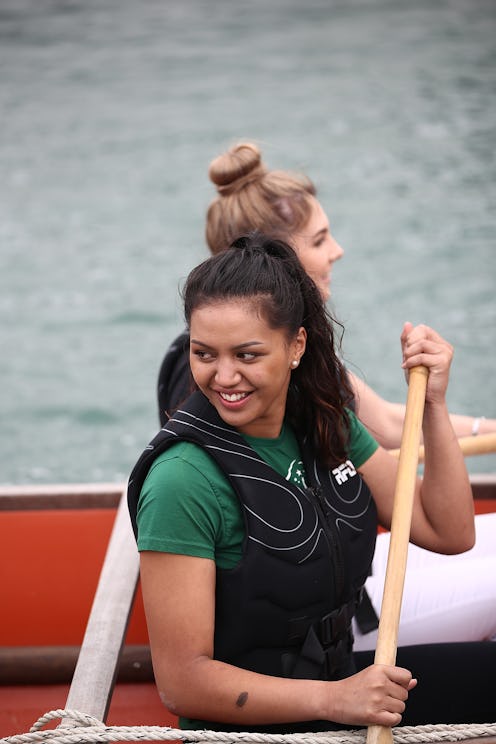
Nearly 30 percent of Americans have at least one tattoo, so it's safe to say tattoos have been normalized pretty much everywhere. I remember when I got my first tattoo and my mom told me I'd never find a job — times have definitely changed. Still, there's one place where tattoos are definitely still touchy: the pageant stage. Some women have revealed their tattoos during national and international pageants, but it's still relatively rare. If you're watching Miss Universe 2017, you may find yourself asking, "What is Miss New Zealand's tattoo?" Fans first spotted the ink on Harlem-Cruz Atarangi Ihaia's shoulder during Miss Universe's national costume portion on Nov. 25, and they are on board with it.
Even if you don't love the tattoo, you'll appreciate it more once you learn its significance. According to MāoriTelevision, the 19-year-old contestant is wearing tā moko, a traditional tattoo worn by New Zealand's indigenous people. It's also called a Māori tattoo, and it's been around for centuries. Ihaia told MāoriTelevision the tattoo represents her family.
"It represents my ancestors and was created by [New Zealand artist] Charles Paringatai for me to show my sisters, brothers and my parents," she told the television station.
Does having a tattoo hurt a contestant's chances of advancing? Per MāoriTelevision, "There is nothing in the national or international rules that forbid any contestant from expressing herself through any aspect of her cultural identity." Still, some Twitter users wondered whether Miss New Zealand's tattoo would impact her chances of making it to the finals.
Ihaia didn't end up making it to the top 16 finals during the Nov. 26 pageant, but her fans are still obsessed with her and her traditional tattoo. It's super significant to see indigenous representation on an international stage, and people were quick to celebrate the victory. The Māori people are a significant part of New Zealand's culture, yet they experience a saddening amount of racism and discrimination in their home country. They are more likely to deal with mental health issues and also face economic inequality at a higher rate than their counterparts. Ihaia choosing to proudly display her tattoo during Miss Universe 2017 wasn't a fashion statement — she was expressing her unashamed pride in her culture.
On her Facebook, Ihaia regularly switches between English and Te Reo, the Māori language. In a recent post, she explained why the Miss Universe pageant means so much to her.
"The meaning of winning is a bit different for me, it’s not just about the TITLE AND THE CROWN," she wrote. "It’s about leaving here knowing I done BEYOND MY BEST to represent myself and my country, leaving here a changed woman, having new friends from all around the world, being confidently beautiful being myself, and last but not least having THE BEST MEMORIES of being Miss Universe New Zealand at Miss Universe here in LAS VEGAS and enjoying this ONCE IN A LIFETIME OPPORTUNITY. So basically there’s no way I can lose."
In a post about the preliminary swimsuit competition, she shared her struggles with body insecurity and hating her stretch marks.
"I really REALLY wanted to inspire that girl/woman that may not be confident because of stretch marks or because of ANY IMPERFECTION of their body," she wrote. "I wanted them to see me embracing my imperfections on a WORLD STAGE and just being CONFIDENT in my own BODY."
Based on Ihaia's attitude toward the pageant, it's clear she has a lot to be proud of. She's an inspiration, especially because of her fearless choice to display a part of her culture so prominently.